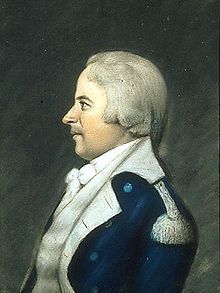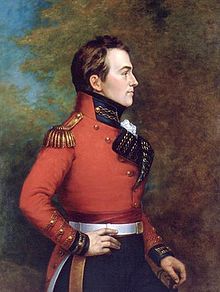The Siege of Detroit led to the capture of Detroit in the early months of the War of 1812. A British force under Major General Isaac Brock with American Indian allies under Shawnee leader Tecumseh used bluff and deception to intimidate Brigadier General William Hull into surrendering the fort and town of Detroit, Michigan, and his dispirited army, which actually outnumbered the victorious British and Indians.
Jump to:
Prelude

American Perspective: America declared war on Great Britain but was ill-prepared for what lay ahead. James Madison promoted old Revolutionary War generals who were old, fat, and past their prime, and the fort at Detroit was no exception.
General William Hull was given the position. He was unorganized and was not used to the tactics used by the natives on the frontier. If Detroit fell, it would put the entire section of Northern Ohio at risk.
British and Native American Perspective: British Commander Isaac Brock understood that he did not have to rush his men to Detroit due to the Americans being unprepared for war. He also learned that morale was low and that the Americans had overestimated their numbers.
Once preparations were made, Brock set out with his provincial militia and native allies towards Detroit. If Detroit fell, it would give the British control over the Michigan Territory.
The Fighting

Brock and Tecumseh used several bluffs to fool General Hull and his Americans that there were more troops than there were. The troops were told to light individual fires instead of one fire per unit, thereby creating the illusion of a much larger army.
They marched to take up positions in plain sight of the Americans, then quickly ducked behind entrenchments and marched back out of sight to repeat the maneuver. The same trick was carried out during meals, where the line would dump their beans into a hidden pot and then return out of view to rejoin the end of the line.
On August 15, General Isaac Brock began bombarding Fort Detroit, joined by the armed vessel General Hunter and the 20-gun sloop-of-war Queen Charlotte. Tecumseh's warriors, meanwhile, paraded several times past a gap in the forest where the Americans could see them while making loud war cries.
While Brock and Tecumseh were preparing to attack, a shell exploded in the fort, causing casualties. General Hull, believing the force to be much larger than it was and fearing a slaughter of women and children inside the fort, ignored the advice of his subordinates and hoisted a white flag of surrender.
Without even firing one shot at the British, General Hall surrendered Fort Detroit and gave the British control of the Michigan territory.
Aftermath
The British and Allied victory raised everyone's morale. Indians began to become more aggressive at remote military outposts and frontier settlements. The provincial militia gained confidence, and in Upper Canada, the population and militia were encouraged, particularly in the Western districts where they had been threatened by Hull's army.
On the American side, General William Hull was shamed and eventually court-martialed. The population on the frontier in Northern Ohio lived in fear of Indian raids, and the American morale fell to a low. Incompetent and passive leadership had left the American frontier exposed.

